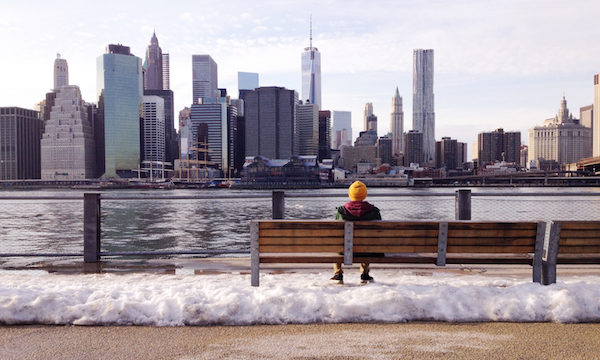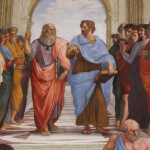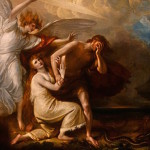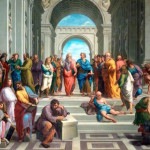On Liberty and Freedom: A Dialogue
by Lucas Holt
Filed under Man

I travelled down to New York Harbor to meet my dear friend Franz. No sooner had I arrived at our meeting place than when the sun began to emerge from its hiding place and light up the sky above and the waters beneath. As it leapt up from its abode its warm rays stretched out and rested on the cold and fragile buildings of the city. There is something about a sunrise that gives one hope. Soon I noticed Franz approaching in the distance.
“Hello, friend!” he shouted from afar. “Good day for sailing, don’t you say?”
“It is a rather beautiful morning,” I said. “Tell me, Franz, what is liberty?”
“Oh, Arthur, we’ve barely started the day and you are already philosophizing! Let me light my pipe first and get a smoke in and then I’ll be happy to discuss this with you.”
“Very well,” I said, wearing a grin on my face. I valued my friendship with Franz dearly. We could talk about anything and everything. Nothing was off the table. And the best part is that we each valued each other no matter what, for we both knew that disagreement did not have to lead to opposition.
After Franz finished his smoke he began, “Okay. So you want to know what liberty is? Well, it is freedom, is it not? Seems rather straightforward.”
“I suppose so, yes, but are not liberty and freedom the same thing? And if they are the same thing, then have we really progressed in our understanding of liberty at all?”
“I guess they are the same thing.”
“Well, let us continue with our plans for the day, shall we? Let’s go to the dock and prepare for our sail. Once we are in the water we can resume our conversation and let it be our issue to tackle for the day.”
“That sounds like a fine plan,” said Franz.
We walked a decent ways and then finally made our way to the dock where Franz’s sailboat lay. By now the sun had risen higher and it was much warmer than when we had first met.
We set out near the upper part of the bay, and as we made our way I asked Franz, “Tell me, would you say we live in a free country?”
“Why, yes,” he said.
“What is it that makes the United States of America a free country?”
“We do not have an oppressive government.”
“I see,” I said. “So freedom from oppression is what makes us free?”
“Yes, I think so.”
“I would like to know how you define ‘oppression’,” I said. “But let us leave that aside for a moment. In this sense freedom is seen in negative terms.”
“What do you mean, Art?”
“Well, this. Can it not also be the case that freedom is for something, and not only from something? There is the sense in which we are free from a tyrannical government, but is it not also the case that we have the freedom to do things? If so, there is both a negative sense of freedom and a positive one.”
“I see what you are saying,” said Franz. “That certainly makes sense. We have the ability to make choices and choose how we live our lives. And in so doing there are various freedoms allotted to us.”
“Precisely,” I said. “But tell me, my dear Franz, is freedom then the permission to do whatever it is we want?”
“I am not sure. It appears to be that way. If someone tried to limit my autonomy I would be very skeptical. Would that not be a violation of my freedom as an individual?”
“Would it?” I asked. “Is the freedom to do whatever you want really freedom? Consider this on the larger scale. If every person in this country defined freedom as you just have, then would not we live in anarchy rather than a democratic republic? A society where anyone can do as they please seems like a dangerous society to live in indeed.”
“Now, now, Arthur, you know that I would never advocate for anarchy. Never!”
“I know, Franz, I know. But the way you described what freedom is certainly sounded like it. Which means we need to work harder at defining what freedom truly is. Now, isn’t it true that freedom consists in having certain restrictions? For example, consider our nation. We are a nation of laws. Our leaders constantly say that we are a nation of laws, and so on. And yet we still live in a free country, right?”
“Yes, that is true,” he said.
“So laws can liberate?” I asked.
“I suppose they can.”
“Consider also the sonnet. Both Petrarchan and Shakespearean sonnets have certain parameters that guide its composition. The use of iambic pentameter, the narrative arc, and so on are ways in which a sonnet has limitations. The author can play around with these, of course, and so they are not rigid, but nevertheless these limits are there. But here is the fascinating thing: these limits actually allow a writer to find creative possibilities that he or she might never have considered otherwise. So, in one way the restraints open up freedoms.”
“Why, I never even thought of that,” exclaimed Franz.
“So we agree then, that freedom consists of having restraints?”
“Yes, I suppose we do. But is it not true that some restraints can be oppressive?”
“Certainly so, my dear Franz. Certainly so.”
“So then, it is not just having restraints but having the right restraints.”
“Indeed, it must be. That is a great point, Franz.”
“So how are we to find the right restraints?” asked Franz. “Is finding the right constraints even possible? Are we flirting with utopian concepts here, Art? For even in our own country it is not perfectly right. It is true that we are free, but surely there are laws that are imperfect insofar as preserving liberty in its truest form. In finding the right restraints we ought then also to seek what true goodness is, and justice, should we not?
“You’re absolutely right,” I said.
“Oh dear! That would put us on a lengthy pursuit!”
“Yes, it would,” I said. “But it is a worthy pursuit, and one we cannot afford to abandon. We must do this not just for ourselves but also for our children.”
“Oh how true!”
“I want to touch on something you just said, Franz, regarding finding proper constraints. For it seems to me that a free country can only remain free to the extent that its citizens and its leaders are virtuous. And they can only be virtuous if they possess an inner freedom.”
“I’m not sure I see where you are going with this, Art. Can you please explain?”
“Certainly. As we have been discussing, while laws prohibit certain actions we can take in society, we agree that laws are necessary for true freedom to exist; otherwise we have anarchy and not freedom. Well, then we recognized that true that freedom consists not only in having restraints but having the right restraints in order to have human flourishing and not oppression. Well, to the extent that such a proper society could be maintained rests on the leaders to create just laws and the citizens to obey those laws. So, the populace must be virtuous, willing to abide by the rule of law and to implement laws that allow for true freedom. But in order for a person to be virtuous, he or she needs to have a moral constitution, otherwise how will they be able to distinguish between that which is good and that which is bad? This is what I mean by an inner freedom: a proper morality in the individual soul.”
“I think I see what you’re saying,” said Franz. “But how does one come to a proper morality inside themselves?”
“You ask an important question. Have you ever read Plato? His masterpiece, the Republic, treats this very question. It is in Republic that Plato presents his famous tripartite structure of the human soul.”
“Well, what is it?”
“Humans have a rational part, a spirited part and an erotic part. The rational part controls thinking and, in a good human, governs. The spirited part corresponds with the higher passions, like courage. The erotic part deals with the passions of the body, such as the desire for food and sex.1. When within the soul appetites follow will and will follows reason then there is an inner harmony.”2
“I see. I need to ponder this for a moment.”
“There are some things I disagree with in Plato. For instance, I don’t think he takes enough account of the fickleness of human beings. Are we really capable of ordering our own souls? But he does make good points about how inordinate desires can lead one astray. Things like food, sex, and drink, are good; but when they become immoderate they can take over and give us inordinate desires that can force us to be slaves to them. We must practice self-mastery, and so a healthy asceticism seems requisite. However, like I was saying, we ourselves can only do so much. Our wills are insufficient. We need divine intervention.”
At this point we were making our way past the island where Lady Liberty dwells.
“Wait,” I said. “Let us behold this majestic frame! Beacon of hope! Have you ever read the poem that Lazarus wrote which is on the pedestal of the statue?”
“Why, no, I haven’t.”
“Let me recite it for you. It really is quite beautiful.”
“Oh, Art, you’ve always been an orator! Delight me with your speech.”
“The New Colossus by Emma Lazarus:
Not like the brazen giant of Greek fame,
With conquering limbs astride from land to land;
Here at our sea-washed, sunset gates shall stand
A mighty woman with a torch, whose flame
Is the imprisoned lightning, and her name
Mother of Exiles. From her beacon-hand
Glows world-wide welcome; her mild eyes command
The air-bridged harbor that twin cities frame.
"Keep ancient lands, your storied pomp!" cries she
With silent lips. "Give me your tired, your poor,
Your huddled masses yearning to breathe free,
The wretched refuse of your teeming shore.
Send these, the homeless, tempest-tost to me,
I lift my lamp beside the golden door!"3
“Bravo! Bravo!” exclaimed Franz.
“Do you know why there are seven spikes coming out of her crown?” I asked.
“No, I don’t,” said Franz.
“The seven spikes represent the seven oceans and the seven continents of the world, indicating the universal concept of liberty.4 And this is the heart of it, my friend. That this concept is universal is telling. It is why I go so far as to say that freedom cannot merely be external but internal. There is a deep yearning within each human soul for a sense of liberation: a liberation from something and for something.”
After this, we both sat in silence for a while and thought deeply about our conversation. After some time we continued our sail, now traveling south with a nice wind at our back guiding us along.
Related Posts
Notes:
- John Mark Reynolds, When Athens Met Jerusalem: An Introduction to Classical and Christian Thought, (Downers Grove, IL: InterVarsity Press, 2009), 161. ↩
- Peter Kreeft, “Justice, Wisdom, Courage, and Moderation: The Four Cardinal Virtues”. http://www.catholiceducation.org/en/culture/catholic-contributions/justice-wisdom-courage-and-moderation-the-four-cardinal-virtues.html From Peter Kreeft, Back to Virtue (San Francisco: Ignatius Press, 1986). ↩
- Emma Lazarus, “The New Colossus” https://www.nps.gov/stli/learn/historyculture/colossus.htm ↩
- Sophie Christie, “Statue of Liberty: 50 Fascinating Facts” in The Telegraph, 28 October 2015, http://www.telegraph.co.uk/travel/destinations/north-america/united-state/new-york/articles/Statue-of-Liberty-50-fascinating-facts/ ↩
Note: Our goal is to cultivate serious and respectful dialogue. While it's OK to disagree—even encouraged!—any snarky, offensive, or off-topic comments will be deleted. Before commenting please read the Commenting Rules and Tips. If you're having trouble commenting, read the Commenting Instructions.












